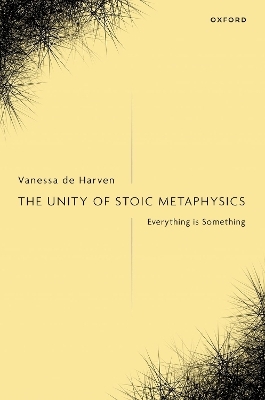
The Unity of Stoic Metaphysics
Oxford University Press (Verlag)
978-0-19-893016-7 (ISBN)
- Noch nicht erschienen (ca. Januar 2025)
- Versandkostenfrei innerhalb Deutschlands
- Auch auf Rechnung
- Verfügbarkeit in der Filiale vor Ort prüfen
- Artikel merken
The Unity of Stoic Metaphysics argues that the Stoics were sophisticated metaphysical thinkers responding to Plato's Sophist and forging a bold new path between materialism and idealism, with a one-world metaphysics best characterized as non-reductive physicalism. The book is divided into five sections:
Section I, Something, develops the suggestion that the Stoics arrived at the genus Something and their two ontological criteria for being Something by careful reflection on Plato's Sophist, finding new depth to Plato's challenges as well as to the Stoic response.
Section II, Bodies, offers an account of Stoic corporealism that takes us from the ontology of what exists to the metaphysics of body, explaining how body can be the fundamental grounds of the cosmos and how qualities can be corporeal.
Section III, Incorporeals, takes us beyond corporealism to physicalism. It argues that the Stoic incorporeals--space, time, and the lekta, or sayables--are all dependent on body for their subsistence, inheriting their spatial, temporal, and semantic properties from underlying body without being nothing but the body.
Section IV, Neither Corporeal nor Incorporeal, argues in support of a tripartite ontology that includes a third class of entities that are neither corporeal nor incorporeal--limits of the continuum, geometrical limits, and creatures of fiction.
Section V, Everything, returns to the Stoic ontology, arguing that concepts are not Something, thus no reason remains to posit a further class of entities, Not-Somethings (outina), in metaphysical limbo between Something and nothing at all. The genus Something is complete and comprehensive as it stands. Everything is Something.
Vanessa de Harven is an Associate Professor in Philosophy at UMass Amherst. She gained her PhD in Philosophy at UC Berkeley in 2012. She specializes in Ancient Philosophy, with a focus on Stoic metaphysics, in particular on Stoic corporealism, the nature of their incorporeals (including especially their novel semantic entities, the lekta, roughly, the meanings of our words), and the status of pure products of thought, like creatures of fiction and mathematical entities, which are neither corporeal nor incorporeal. In addition to work on the Stoics and the Hellenistic era, de Harven has research interests in Plato's metaphysics and epistemology, in Socratic intellectualism, and in Presocratic philosophy.
Introduction
Section I. Something
1: Plato's Sophist
2: Ontological Criteria
Section II. Bodies
3: Body as Such
4: Bodies Blending
5: Basic Bodies
6: Building Bodies
7: The Categories, State of the Debate
8: The Categories, A Fresh Start
Section III. Incorporeals
9: The Incorporeals, A Grounded Account
10: Space
11: Time
12: The Lekta, or Language is Earthborn Too
Section IV. Neither Corporeal nor Incorporeal
13: Limits
14: Creatures of Fiction
Section V. Everything
15: Concepts
16: Everything is Something
| Erscheint lt. Verlag | 9.1.2025 |
|---|---|
| Verlagsort | Oxford |
| Sprache | englisch |
| Maße | 156 x 234 mm |
| Themenwelt | Geisteswissenschaften ► Philosophie ► Metaphysik / Ontologie |
| Geisteswissenschaften ► Philosophie ► Philosophie Altertum / Antike | |
| ISBN-10 | 0-19-893016-X / 019893016X |
| ISBN-13 | 978-0-19-893016-7 / 9780198930167 |
| Zustand | Neuware |
| Informationen gemäß Produktsicherheitsverordnung (GPSR) | |
| Haben Sie eine Frage zum Produkt? |
aus dem Bereich


